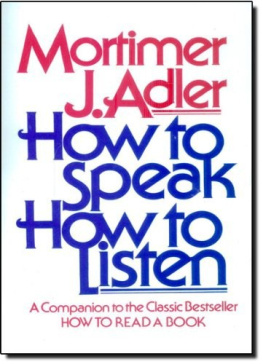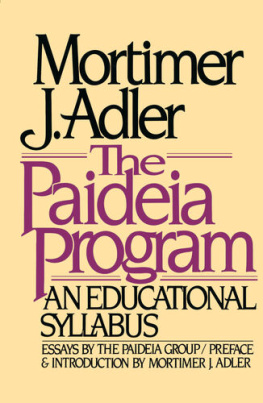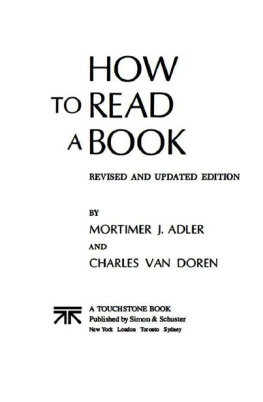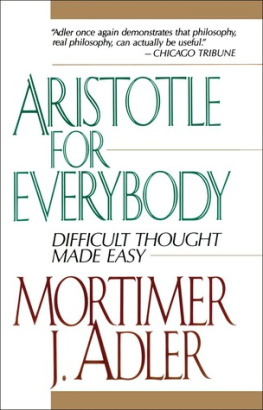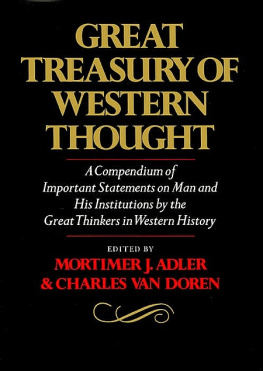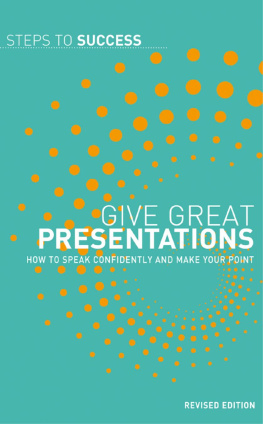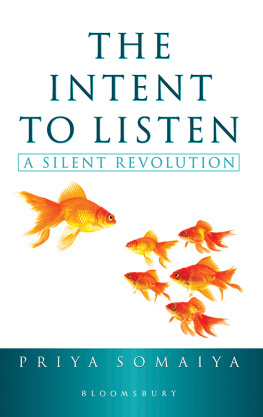Mortimer J. Adler - How to Speak How to Listen
Here you can read online Mortimer J. Adler - How to Speak How to Listen full text of the book (entire story) in english for free. Download pdf and epub, get meaning, cover and reviews about this ebook. year: 1997, publisher: Touchstone, genre: Romance novel. Description of the work, (preface) as well as reviews are available. Best literature library LitArk.com created for fans of good reading and offers a wide selection of genres:
Romance novel
Science fiction
Adventure
Detective
Science
History
Home and family
Prose
Art
Politics
Computer
Non-fiction
Religion
Business
Children
Humor
Choose a favorite category and find really read worthwhile books. Enjoy immersion in the world of imagination, feel the emotions of the characters or learn something new for yourself, make an fascinating discovery.
- Book:How to Speak How to Listen
- Author:
- Publisher:Touchstone
- Genre:
- Year:1997
- Rating:3 / 5
- Favourites:Add to favourites
- Your mark:
- 60
- 1
- 2
- 3
- 4
- 5
How to Speak How to Listen: summary, description and annotation
We offer to read an annotation, description, summary or preface (depends on what the author of the book "How to Speak How to Listen" wrote himself). If you haven't found the necessary information about the book — write in the comments, we will try to find it.
How to Speak How to Listen — read online for free the complete book (whole text) full work
Below is the text of the book, divided by pages. System saving the place of the last page read, allows you to conveniently read the book "How to Speak How to Listen" online for free, without having to search again every time where you left off. Put a bookmark, and you can go to the page where you finished reading at any time.
Font size:
Interval:
Bookmark:

B Y THE S AME A UTHOR:
Philosopher at Large Aristotle for Everybody How to Think About God Six Great Ideas The Angels and Us The Paideia Proposal: An Educational Manifesto

TOUCHSTONE
Rockefeller Center
1230 Avenue of the Americas
New York, NY 10020
www.SimonandSchuster.com
Copyright 1983 by Mortimer J. Adler
All rights reserved, including the right of reproduction in whole or in part in any form.
First Touchstone Edition 1997
T OUCHSTONE and colophon are registered trademarks of Simon & Schuster Inc.
Manufactured in the United States of America
9 10
Library of Congress-in-Publication Data is available.
ISBN-13: 978-0-684-84647-7
eISBN: 978-1-439-10489-7
ISBN-10: 0-684-84647-0
Dedication
TO Arthur A. Houghton, Jr., who delights in the interrupted speech of good conversation
Contents
PART ONE
Prologue
CHAPTER 1
The Untaught Skills
How do you make contact with the mind of another person? In what way should that other person respond to your effort?
Sometimes it is through cries, facial expressions, gestures, or other bodily signals, but for the most part it is by the use of languageby writing and speaking, on the one hand, and by reading and listening, on the other.
These four uses of language fall into two parallel pairs. Writing and reading go together; so, too, speaking and listening. The members of each pair are obviously complementary. Writing gets nowhere unless it is read; one might as well shout into the wind if what one says is not listened to.
Everyone recognizes that some individuals are able to write better than others; they have more skill in doing so, either through talent or through training or both. But even the most skilled writing remains ineffective when it falls into the hands of unskilled readers. We all realize that the ability to read requires training, and we acknowledge that some individuals have much more skill in reading than others.
The same would appear to be true of speaking and listening. Some individuals may have native endowments that enable them to become better speakers than others, but training is required to bring such talent to full bloom. Likewise, skill in listening is either a native gift or it: must be acquired by training.
Four distinct performances are involved in the process by which one human mind reaches out to another and makes contact with it, and skill in each of these performances is required to make that process effective. How many of these skills were you taught in school? How many are your children being taught?
Your immediate response will probably be that you were taught how to read and write, and so are they. You may add at once that you do not think that the training received is up to what it should be, but at least some effort is made at the elementary levels to give instruction in reading and writing.
Instruction in writing continues beyond the elementary level; it goes on in high school and even in the early years of college. But instruction in reading seldom goes beyond the elementary level. It should, of course, because elementary skill in reading is totally inadequate for understanding the books most worth reading. That is why, forty years ago, I wrote How to Read a Book, in order to provide instruction in the art of reading far beyond the elementary levelinstruction that is for the most part absent from our schools and colleges.
How about instruction in speaking? I doubt if anyone can recall being given such instruction in elementary school at the time that some training in writing and reading occurs. Except for special courses in what is called public speaking, and help for those with speech defects, which may be found in some high schools and colleges, there is no instruction in speechthe general art of speechanywhere in the course of study.
What about listening? Is anyone anywhere taught how to listen? How utterly amazing is the general assumption that the ability to listen well is a natural gift for which no training is required. How extraordinary is the fact that no effort is made anywhere in the whole educational process to help individuals learn how to listen wellat least well enough to close the circuit and make speech effective as a means of communication.
What makes these things so amazing and extraordinary is the fact that the two generally untaught skills, speaking and listening, are much more difficult to acquire and more difficult to teach than the parallel skills of writing and reading. I think I can explain why this is so, and I will do so presently.
Widespread and indignant are the complaints about the level of skill that our school and college graduates attain in writing and reading. There are few if any complaints voiced about the level of skill that they attain in speaking and listening. Yet, however low the level of writing and reading is today among those who have the advantages of twelve or more years of schooling, much lower still is the level of skill in speaking that most people possess, and lowest of all is skill in listening.
In the centuries before Gutenberg and the printing press, speaking and listening played a much larger part in anyones education than writing and reading. That had to be, because, in the absence of the printed page and with written books available only to the very few, those who had some kind of schoolingeither by individual pedagogues, in the academies of the ancient world, or in the mediaeval universitieswere compelled to learn by listening to what their teachers said.
In the mediaeval universities, teachers were lecturers in a different sense of the word lecture than the one that is now generally in use. Only the teacher had the manuscript copy of a book that contained knowledge and understanding to be imparted to his students. As the etymology of the word lecture indicates, lecturing consisted in reading a text aloud, accompanied by a running commentary on the text read. Whatever the students learned, they learned by listening, and the better they were able to listen, the more they were able to learn.
In the great mediaeval universities of Oxford and Cambridge, Paris, Padua, and Cologne, basic schooling involved training in the arts or skills that were first called liberal arts by the ancients. These arts included the various skills in dealing with language, on the one hand, and in dealing with operations and symbolism of mathematics, on the other hand.
Plato and Aristotle thought, and the mediaeval universities followed them in thinking, that the arts of grammar, rhetoric, and logic were the skills that had to be acquired for learning how to use language effectively in writing and reading, in speaking and listening. The arts that had to be acquired for learning how to measure, calculate, and estimate went by the names of arithmetic, geometry, music, and astronomy.
These were the seven liberal arts in which mediaeval students were supposed to acquire proficiency in order to become certified as bachelors of art. The word bachelor did not mean that they were unwed males, not yet initiated into the mysteries of marriage. On the contrary, it meant that they were sufficiently initiated into the world of learning to go on studying in the higher levels of the university, in the faculties of law, medicine, or theology.
The B.A. degree was a certificate of initiation, a passport into the world of higher learning. It did not signify that those thus certified were learned, but only that they had become competent as learners by virtue of having acquired the skills of learningskills in the use of language and in the use of other symbols.
Next pageFont size:
Interval:
Bookmark:
Similar books «How to Speak How to Listen»
Look at similar books to How to Speak How to Listen. We have selected literature similar in name and meaning in the hope of providing readers with more options to find new, interesting, not yet read works.
Discussion, reviews of the book How to Speak How to Listen and just readers' own opinions. Leave your comments, write what you think about the work, its meaning or the main characters. Specify what exactly you liked and what you didn't like, and why you think so.

